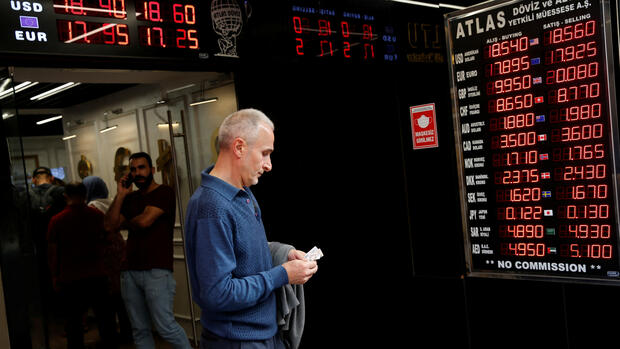Ankara The uncertainty about the outcome of the presidential elections in Turkey unsettles investors. After a temporary interruption in trading, Turkey’s leading index in Istanbul is falling by up to 6.7 percent to 4475 points.
By mid-morning, the index pared losses and recovered partially, but remained clearly in the red overall. According to an evaluation by the Reuters news agency, it is primarily bank titles that are losing: the industry index has fallen by up to 9.6 percent.
The Turkish lira also lost more than three percent in value against the euro in trading on Sunday, but has since compensated for this loss. Since the beginning of the year, the minus has been around 6.8 percent. On Monday, one euro cost 21.38 lira and one US dollar 19.66 lira.
“Markets were still recovering ahead of the ballot when most polls put challenger Kilicdaroglu ahead,” said Timothy Ash, an analyst at Bluebay. “Now it turns out that many investors could have been wrong.”
Because the incumbent Turkish President Recep Tayyip Erdogan is ahead, according to figures from the electoral authority after counting almost all the votes cast in the country. However, he just missed an absolute majority. Overall, he comes to 49.40 percent, said the head of authorities Ahmet Yener on Monday, according to the state news agency Anadolu.
His challenger, CHP’s Kemal Kilicdaroglu, is around five percentage points behind him. 99 percent of the domestic ballot boxes and 84 percent of those from abroad have so far been counted. The candidate of an ultra-nationalist party alliance, Sinan Ogan, comes to 5.3 percent.
Because Erdogan’s party alliance did extremely well in the parallel parliamentary elections, the incumbent is going into the runoff with a head start. One thing is clear: the opposition will not march through in both elections. The markets don’t seem to like that right away.
Turkish Lira: Analysts expect further turbulence
“The Turkish lira is likely to face a turbulent month,” concluded the analysts at Commerzbank on Monday morning. If Erdogan were voted out, “Turkey’s unconventional monetary policy experiment” would have ended, as would the presidential system. “For the lira, this would have been a positive scenario because the opposition government would have immediately restored central bank independence and allowed higher interest rates,” the analysts said.
Commerzbank experts believe that whether the favorite Erdogan will win the runoff also depends on how the exchange rate develops. Monetary and economic policy should therefore be aimed at preventing such a crash until May 28, just as before.
Thomas Gitzel, chief economist at VP Bank, believes that it is unlikely that Erdogan’s re-election will change the basic course of economic policy. “The devaluation of the lira would probably continue.” The latent risk of default will also persist, says the economist.
The financial sector in particular was affected by the fall in the lira and the Turkish interest rate policy.
(Photo: Bloomberg)
In general, the economic data so far shows a mixed picture. At over 40 percent, inflation is the highest it has been in years. The budget deficit also widened again in April, according to data from the National Statistics Institute Tüik on Monday.
The fact that bank stocks in particular are suffering from the current election forecasts is due to the fact that the financial institutions are particularly affected by many government decisions. They had recently massively expanded lending, which also increased balance sheet risks. If the Erdogan government increases interest rates after winning an election, this could cause households and companies to default; if interest rates remain low, bank balance sheets will continue to inflate, with an uncertain outcome.
Despite chaotic economic data: Purchasing power is increasing
Nevertheless, the Turkish real economy seems a bit removed from a real crisis. Unemployment is stable, Turkish export companies in particular earn well according to their quarterly results, and consumers have gained considerable purchasing power because of Erdogan’s many election gifts.
>> Read here: Erdogan wants to replace this colorful alliance
An example illustrates the increased purchasing power: five years ago, Turkish people had to pay around seven minimum wages for a Macbook Air from Apple. There are now around 2.5 minimum wages.
In addition, strange as it may sound, many people have benefited from Erdogan’s economic policies. Less the socio-economic lower class – once one of the main target groups of Erdogan’s electoral campaigns – but above all the new middle and upper classes of Turkish society.
Anyone who owns houses or land could watch the value of land increase every day – sometimes by more than 500 percent within two years, at least calculated in US dollars.
The decisive factor will now be how long the government can keep the exchange rate stable. To do this, it has to use extensive foreign exchange reserves. “In the last few days and weeks we have been able to see from the price chart that the artificial stabilization of the lira is becoming increasingly difficult,” judge the Commerzbank analysts. Once again, the economy could decide whether Erdogan stays in office.
More: Why were so many polls in Turkey wrong?
